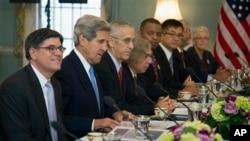“Nothing less than a complete and collaborative transformation of the way we use and produce energy will be enough to tackle the urgent threat of climate change,” U.S. Secretary of State John Kerry said in a recent opinion editorial. “The costs of inaction get more and more expensive the longer we wait — and the longer we wait, the less likely we are to avoid the worst.”
Together, the United States and China account for around 40 percent of total greenhouse gas emissions.
“When I visited Beijing in April [2013] . . . we agreed to launch the Climate Change Working Group,” Secretary Kerry said. “We [subsequently] agreed to accelerate our bilateral climate cooperation by approving five new joint initiatives to curb climate change.”
Two areas of focus will be on reducing emissions from coal use, and from heavy and light-duty vehicles. With existing technologies, we already can capture, store and use carbon from coal plants.
“We’ve agreed . . . to overcome barriers to carbon capture, use, and storage through several integrated demonstration projects,” Secretary Kerry said. “We’ve also agreed to work together on fuel efficiency standards, promote cleaner fuels and vehicle emissions control technologies, and increase efficiency in clean freight.”
“We’re combining forces to promote energy efficiency in buildings, which account for over 30 percent of energy use,” Secretary Kerry continued. “We’re assisting China in improving greenhouse gas data collection and management, the foundation for any effective climate policies. And, together, we’re promoting the growth of smart grids that are . . . more efficient . . . and capable of incorporating more renewable energy and distributed generation.”
“By acting to address climate change, we can secure America’s place — and China’s — in the energy economy of the future,” said Secretary Kerry. “Revolutionizing the way we use and produce energy can be a “win, win, win” — a win for America, a win for China, and win for the world. Let’s seize the opportunity.”
Together, the United States and China account for around 40 percent of total greenhouse gas emissions.
“When I visited Beijing in April [2013] . . . we agreed to launch the Climate Change Working Group,” Secretary Kerry said. “We [subsequently] agreed to accelerate our bilateral climate cooperation by approving five new joint initiatives to curb climate change.”
Two areas of focus will be on reducing emissions from coal use, and from heavy and light-duty vehicles. With existing technologies, we already can capture, store and use carbon from coal plants.
“We’ve agreed . . . to overcome barriers to carbon capture, use, and storage through several integrated demonstration projects,” Secretary Kerry said. “We’ve also agreed to work together on fuel efficiency standards, promote cleaner fuels and vehicle emissions control technologies, and increase efficiency in clean freight.”
“We’re combining forces to promote energy efficiency in buildings, which account for over 30 percent of energy use,” Secretary Kerry continued. “We’re assisting China in improving greenhouse gas data collection and management, the foundation for any effective climate policies. And, together, we’re promoting the growth of smart grids that are . . . more efficient . . . and capable of incorporating more renewable energy and distributed generation.”
“By acting to address climate change, we can secure America’s place — and China’s — in the energy economy of the future,” said Secretary Kerry. “Revolutionizing the way we use and produce energy can be a “win, win, win” — a win for America, a win for China, and win for the world. Let’s seize the opportunity.”






